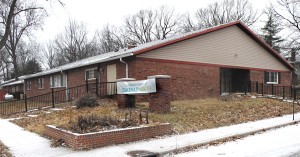The Associate Vice President of Eskenazi Health/Midtown Mental Health Center Julie Szempruch and several other representatives of Midtown Mental Health were on hand at the Historic Irvington Community Council meeting January 20 to discuss the First Home project they will be housing in the former nursing home on South Ritter. They were also there to dispel some rumors and fears residents might have about the First Home project.
Szempruch explained at the meeting that First Home is a transitional housing program for the mentally ill who are experiencing homelessness. The facility will be used as transitional housing for about 35 individuals who are nearly ready to take the next steps to independent living, but who also need support care and assistance to get them there. First Home is a Safe Haven project, and clients stay in it about two years.
First Home has been around since 1997 and has had a remarkable degree of success during that period. In 2013, the program saw 32 individuals discharged — 26 to permanent housing.
First Home’s current facility in Fountain Square has been there for 15 years, Szempruch said. “We’re leaving because it is a very old facility, and it would just cost too much to revamp it and upgrade everything. We couldn’t believe what a great building we got in Irvington.” Formerly The Waters of Irvington, the property has been vacant for a few years. The building’s sale was finalized last year, and plans drawn up to adapt it to First Home’s needs. “A few of the residents have come to visit it with us and are amazed that they’ll be able to live in such a nice place.” No rezoning or variances will be needed to refit the building.
As part of Midtown Mental Health Centers and Eskenazi Health, First Home will have 24 hour professional staff on site, plus a high level of care for residents. Many of the people who will be at First Home have been in care for years, suffering from serious depression, anxiety, or other mental health issues which lead to them being homeless. “We don’t label our clients,” Szempruch stressed. “We want what is best for each one as an individual.” When they are ready to take the steps toward independent living, First Home is where they learn to manage a household and take care of themselves.
About 30 percent of the residents are employed either full or part time, sometimes in the faith community or in other jobs where they will gain confidence and get support and on-the-job training. Others qualify for social security disability or supplementary income. The residents adhere to a schedule, and no alcohol or drugs are allowed on the property. Clients who qualify for the First Home program are eager to begin a transition to independent living. “They tell us, ‘Give us a chance to live,’” Szempruch said.
When looking into First Home’s experience in the Fountain Square neighborhood, Irvington Development Organization’s Executive Director Margaret Banning said that she called the Community Development people for Fountain Square to find out if there had been complaints or concerns. “They had no idea First Home was even in the neighborhood. They had to call around to find out where it was.” The reports have come back that First Home residents make for quiet neighbors who are eager to get involved in the communities in which they lived.
At the HICC meeting, a few people asked if the community could volunteer to help the First Home residents, perhaps with teaching classes or therapy. The staff said they would welcome community involvement.
Plans are being finalized for First Home’s move-in date, which may be later this year after upgrades are completed.



